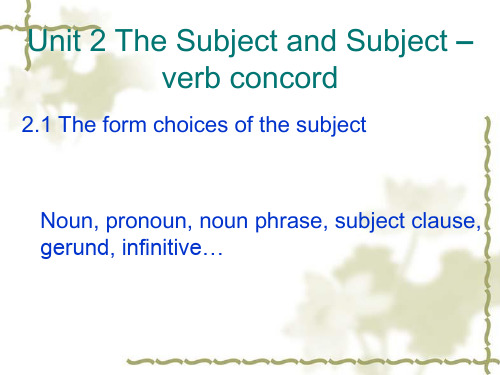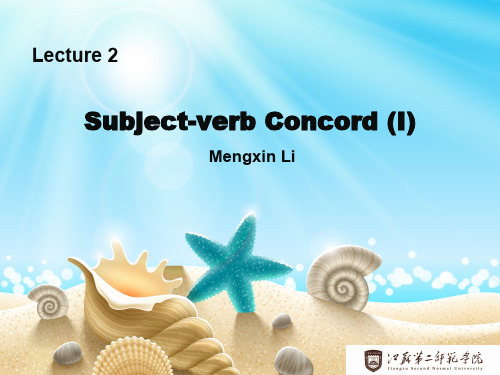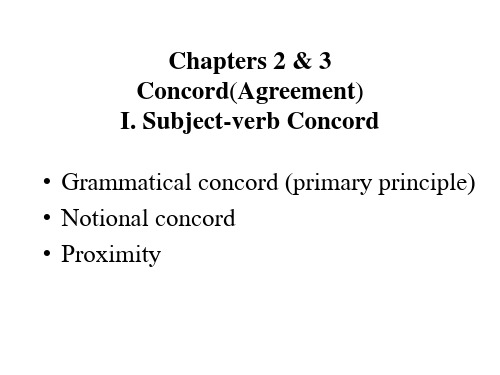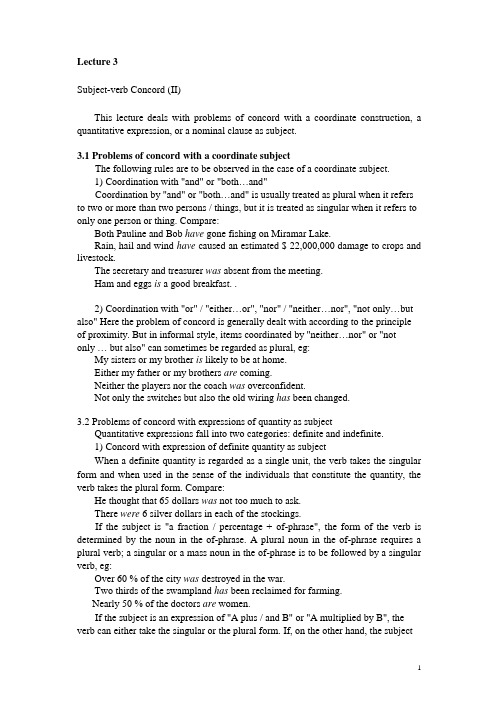英语专业语法书Lecture 2 Subject-verb__ Concord
- 格式:doc
- 大小:43.50 KB
- 文档页数:5






Lecture 3Subject-verb Concord (II)This lecture deals with problems of concord with a coordinate construction, a quantitative expression, or a nominal clause as subject.3.1 Problems of concord with a coordinate subjectThe following rules are to be observed in the case of a coordinate subject.1) Coordination with "and" or "both…and"Coordination by "and" or "both…and" is usually treated as plural when it refers to two or more than two persons / things, but it is treated as singular when it refers to only one person or thing. Compare:Both Pauline and Bob have gone fishing on Miramar Lake.Rain, hail and wind have caused an estimated $ 22,000,000 damage to crops and livestock.The secretary and treasurer was absent from the meeting.Ham and eggs is a good breakfast. .2) Coordination with "or" / "either…or", "nor" / "neither…nor", "not only…but also" Here the problem of concord is generally dealt with according to the principle of proximity. But in informal style, items coordinated by "neither…nor" or "notonly … but also" can sometimes be regarded as plural, eg:My sisters or my brother is likely to be at home.Either my father or my brothers are coming.Neither the players nor the coach was overconfident.Not only the switches but also the old wiring has been changed.3.2 Problems of concord with expressions of quantity as subjectQuantitative expressions fall into two categories: definite and indefinite.1) Concord with expression of definite quantity as subjectWhen a definite quantity is regarded as a single unit, the verb takes the singular form and when used in the sense of the individuals that constitute the quantity, the verb takes the plural form. Compare:He thought that 65 dollars was not too much to ask.There were 6 silver dollars in each of the stockings.If the subject is "a fraction / percentage + of-phrase", the form of the verb is determined by the noun in the of-phrase. A plural noun in the of-phrase requires a plural verb; a singular or a mass noun in the of-phrase is to be followed by a singular verb, eg:Over 60 % of the city was destroyed in the war.Two thirds of the swampland has been reclaimed for farming.Nearly 50 % of the doctors are women.If the subject is an expression of "A plus / and B" or "A multiplied by B", the verb can either take the singular or the plural form. If, on the other hand, the subjectis one of “A minus B" or "A di vided by B", the verb can only be singular, eg: Seven plus / and five (7 + 5) makes / make twelve.Forty minus fifteen (40 -15) leaves twenty-five.Five times eight (5 x 8) is / are forty.Forty divided by eight (40 -7 8) is five.If the subject is a noun phrase composed of "one in / out of + plural noun", the verb takes the singular form in formal style, but in informal style it can be plural, eg: One in ten students has / have failed the exam.One out of twenty was / were badly damaged.2) Concord with expression of indefinite quantity as subjectWhen the subject is a noun phrase composed of "all of ..., some of ..., none of ..., half of ..., most of ..., etc", the number of the verb is determined by the noun in theof-phrase. This is also true of "lots of, heaps of, loads of, scads of, plenty of + noun", eg :All of the cargo was lost.All of the crew were saved.Lots of food is going to waste.Lots of people are waiting outside.When the subject is a noun preceded by "a portion of, a series of, a pile of, a panel of", the verb invariably fakes the singular .form, whatever the forms of the noun. Likewise, when the subject is a noun, singular or plural, preceded by "a kind / sort / type of" or by "this kind / sort / type of", .the verb takes the singular form. If "kind / sort / type of" is preceded by "these / those" and followed by a plural noun, the verb should be plural, eg:A substantial portion of the reports is missing.A series of accidents has been reported.This kind of man annoys me.That type of men is dangerous.These sort of machines are up to date.If the subject is a noun phrase composed of "many a -;/- noun" or "more than one + noun", this kind of noun phrase, though notionally plural, is treated as singular: Many a man has done his duty.More than one game was lost.If the subject is a plural noun preceded by "an average of / a majority of", the verb form is determined by the notion of the noun phrase: if the noun head is the word" average / majority", the verb should be singular; if the head is the plural noun, the verb should be plural. Compare:An average of 25 applications a month is not unusual.An average of 25 persons apply each month.3.3 Other problems of subject-verb concordThere are other problems of subject-verb concord that are worth mentioning.1) Problems of concord with a nominal clause as subjectWhen the subject is a nominal clause introduced by what, who: which, how, why, whether, etc, the verb usually takes the singular form. But when two or more such clauses are coordinated by and or both. .. and, a plural verb is required, eg: What caused the accident is a complete mystery.What caused the accident and who was responsible for it remain a mystery to us.In SVC constructions with a what- clause as subject, the verb usually takes the singular form. But when the subject complement is plural, or when the what- clause is plural in meaning, the verb of the main clause can be plural, eg:What was real to him were the details of his life.What are often regarded as poisonous fungi are sometimes safely edible.2) Subject-verb concord with' a non-finite clause as subjectWhen the subject is a non-finite clause, the verb of the main clause usually takes the singular form. But when two or more such clauses are coordinated by and, the verb of the main clause takes the singular form when the subject refers to one thing, and the plural form when the subject refers to separate things, eg:To climb mountains requires courage.Playing tennis is very good exercise.Compare:Reading Ibsen and solving a quadratic equation are entirely different assignments.3) Subject-verb concord in relative clausesIn the construction of "one of + plural noun + relative clause", the principle of grammatical concord is generally observed. Sometimes, especially in British English, in order to lay emphasis on "one", the verb can also take the singular form. When "one" is preceded by "the" or "the only" the verb can only be singular. Compare: Joan is one-of those people who go out of their way to be helpful.Jasper White is one of those rare people who believes in ancient myths.Keves is the only one of the players who has learned all the rules.4) Subject-verb concord in cleft-sentencesIn cleft-sentences, subject-verb concord in that- / who- clause is generally determined by the number of the focal element functioning as subject in the clause. There is one point that should be noted: when the focal element is "I", the verb TO BE in the following who- / that-clause usually agrees with "I" in both person and number; if, on the other hand, the focal element is "me" instead of "I", the verb TO BE in the following who- / that- clause should take the third person singular number, eg :It is I who am to blame.It is me that is to blame.5) Subject-verb concord in existential sentencesIn existential sentences, subject-verb concord is generally determined by thenumber of the" notional subject", but in informal style, especially in spoken language, the verb often agrees with the "'formal subject" and takes the singular form, even though the notional subject is plural. When the notional subject is a coordinate construction, the verb form goes with the first coordinate element of the notional subject, singular or plural, eg:There i s a note left on the desk.There are three routes you can take.There's more grace and less carelessness.There's a long springboard and three rafts at varying distances from the shore.。
Lecture 2 Subject-verb Concord (1)By subject-verb concord is meant agreement between subject and predicate verb in number.2. 1 Guiding principlesThere are three principles guiding subject-verb concord; they are principles of grammatical concord, notional concord and proximity.1) Grammatical concordThe principle of grammatical concord refers to the rule that the verb must match its subject in number. If the subject is plural, the verb should take the plural form; if, on the other hand, the subject is singular or is a 'mass noun, the verb should take the singular form, eg:Both boys have their own merits.Every girl comes on time.Much effort is wasted.Difficulties arise when this principle comes into conflict with the other two principles: principle of notional concord and principle of proximity.2) Notional concordThe principle of notional concord refers to the rule that the verb can sometimes agree with the subject according to the notion of number rather than to the actual presence of the grammatical marker for that notion, eg:The government have asked the country to decide by a vote.Fifteen miles seems like a long walk to me.3) ProximityThe principle of proximity denotes agreement of the verb with a closely preceding noun phrase in preference to agreement with the head of the noun phrase that functions as subject, eg:Either my brothers or my father is coming.No one except his own supporters agree with him.Neither Julia nor I am going.Note that grammatical concord is the basic principle, but when the subject is realized by a collective noun, a coordinate form or an expression of quantity, the other two principles will have to be considered.2.2 Problems of concord with nouns ending in -sThere are quite a few nouns that end in -s but which are not countable. Some of these nouns are treated as singular, some as plural, and some either as singular or as plural. All this can be dealt with under the following headings.1) Disease and game names ending in -sNames of diseases ending in -s are mostly treated as singular, but there are a few suchnames (as measles and rickets) which can be used either as singular or as plural. Game names ending in -s are generally used as singular with the exception of cards which is usually treated as plural.2) Subject names ending in -icsNames of subjects ending in -ics are generally singular nouns, but some such nouns are treated as plural when used in other senses than subject names. Compare: Acoustics is the science of sound.The acoustics in the new concert hall are faultless.Economics is a required course for all the students.The economics of the project are still being considered.3) Geographical names ending in -sGeographical names such as the names of archipelagos, mountain ranges, straits and falls are generally used as plural, except for a few treated as singular when used as country names, eg:The Himalayas have a magnificent variety of plant and animal life.The Straits of Gibraltar have not lost their strategic importance.In early January 1976, the Netherlands was hit by its worst storm since 1953.4) Other nouns ending in -sNames for things made of two parts such as scissors, pincers, etc are usually used as plural. But when they are preceded by such unit nouns as a pair of and two pairs of, the number form of the following verb is generally determined by the number marker of the unit noun.Nouns usually taking plural endings such as archives, arms and clothes are generally used as plural with the exception of whereabouts, dramatics, etc which may be treated eith6r as plural or as singular.Nouns ending in -ings such as clippings, diggings, etc are generally used as plural with the exception of tidings which can be used both ways. There are also nouns such as barracks and headquarters whose singular and plural number share the same form. These nouns are treated as plural when used in the plural sense, or vice versa.2.3 Problems of concord with collective nouns as subjectCollective nouns are singular in form but plural in meaning. The choice between grammatical and notional concord is mostly dictated by usage.1) Collective nouns usually used as pluralThese include people, police, cattle, militia, poultry, vermin, etc:The Chinese people are a great people.Domestic cattle provide us with milk, beef and hides.2) Collective nouns usually used as singularThese include foliage, machinery, equipment, furniture, merchandise, etc:All the merchandise has arrived undamaged.All the machinery in the factory is made in China.3) Collective nouns used either as plural or as singularThere are collective nouns that can be used either as plural or as singular. The choice of the verb form following such nouns depends on the exact meaning of the noun in a specific context. When the noun is used in the sense of a collective as a whole, the verb takes the singular form. If, on the other hand, the noun is used in the sense of the individuals that make the collective, the verb takes the plural form. Compare:The anti-crime committee is to make, its report tomorrow.The committee are divided in opinion about this problem.That group of soldiers is a top-notch fighting unit.That group of soldiers have the best ratings of individual performance.4) A committee of, etc + plural nounWhen a plural noun is preceded by a committee of / a board of / a panel of, the verb usually takes the singular form, eg:A committee of five men and three women is to consider the matter.The board of directors is responsible for the management of the company.Keys to the exercisesEx. 2Ae2.are3.has / have4.are5.are6.are7.was / were8.is9.costs10.were11.are12.are13.was14.are15.lie16.were17.are18.is19.is20.was21.Has23.is24.is25.are26.is27.are28.cover / are29.is / are30.was / were Ex. 2 B2.have3.is, is4.was5.were6.is7.is8.are9.is10.are, are11.have12.are, their, their13.was, it, was14.It / They, is / are15.are, their, they, disapprove16.were, they17.was18.are19.were20.were。